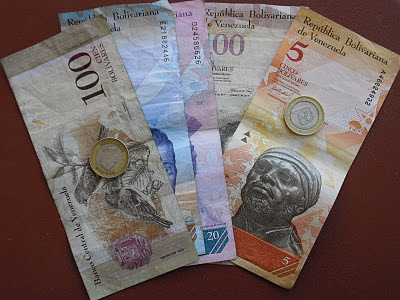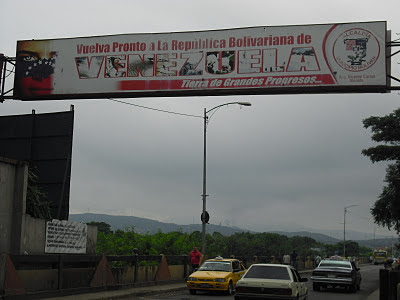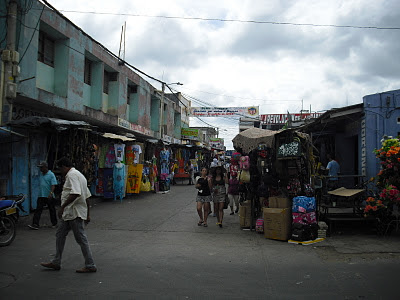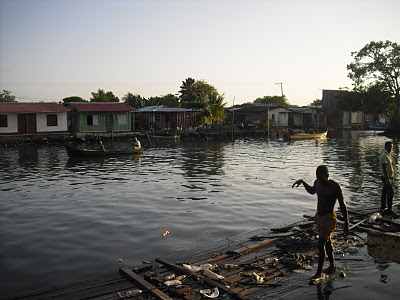The main problem with first impressions, as
they say, is that you only get to make one. Alas, for Venezuela – not that the
many seemingly myopic locals will care – what we witnessed on our admittedly brief
and limited sojourn into the country will not have us rushing back.
In theory,
there shouldn’t be a major difference between the Colombian and Venezuelan cultures.
Heck, the two countries were once together – along with other territories - in a
greater Gran Colombia. On the ground, though, they seem worlds apart.
The
warmth and friendliness that you’ll instantly get on arrival in Colombia is
replaced by a coldness bordering on hostility from a significant proportion of
the population in Hugo Chavez’s Bolivarian Republic. Of course, El Presidente is perhaps one of the main reasons for this - we won't go there just now, though.
Making the overland crossing into the
country, it doesn’t take long to notice the more negative vibe to the place.
From the border crossing a short drive outside the Colombian town of Maicao to
Venezuela’s second city of Maracaibo – no more than a two-hour drive – you’re
likely to be asked for your passport and visa stamp at least ten times.
Fantastic use of resources that.
What difference in your circumstances are they
expecting to find 10 kilometres down the road from the last check?
Possibly it
is a siege mentality thing derived from the top – ‘the foreigners are coming to
infiltrate us, make them feel ill at ease’ sort of thinking. If as a nation
it’s that paranoid, why not just follow the North Korean lead and don’t let
them in? It might just make life easier for everybody concerned.
 |
| Bolivar Fuerte - what's it worth? |
Then you have the currency – the "old" Bolivares or "new" Venezuelan Bolivar Fuerte (VEF). The two are still used in
pricing, but it’s the ‘Fuerte’ you’ll be physically using – it’s basically the
old money put into more basic units from what we can gather.
Go to an ATM
machine and you’ll get at best five VEF for your one euro. Go to one of the
numerous cambios – currency exchange operators – on the street and one euro
will get you, at least, a very nice 9.5 VEF. Almost double the value than what
you’ll get via official means at an ATM/bank.
So depending on how you’re
getting your money in Venezuela, the country can either be pretty economical or
quite damn expensive compared to its neighbours.
Knowing what we know now, the
best thing is to bring in with you large volumes of a foreign currency to
exchange on the street during your time there. Of course, such a strategy comes
with its own security problems, but it’s probably worth the risk.
Mentioning money, Venezuelan business
people we encountered seemed overly obsessed with it – and that’s saying
something considering the continent we’re in. Everything must be paid up front
– even at an internet cafe.
The advice here is to only give the bare minimum
required for whatever you’re getting or using. That’s because – for the most
part – once you hand over your cash, you won’t be getting it back if the
circumstances of what you originally paid for change. That’s a quick lesson to
learn, especially if Venezuela happens to be your first Latin American
experience or indeed if you’re visiting the country from Colombia, where they
tend to have a far more relaxed, reasonable approach in this regard.
 |
| Adiós Venezuela. 'Come back soon' - we'll think about it. |
Then you have the dirt. Now, as
the last few weeks have highlighted, this is something that doesn’t tend to
overly bother us.
However, a rubbish tip of a place – as is much of what we saw
of the country – coupled with a sour ambiance does not make for a good mix.
Throw in the most aggressive drivers we’ve come across on the continent –
another big statement for Latin America, but here they will knock you down if
you get in their way, no question – and you begin to wonder why you bothered
coming.
Like everything, though, you will find
exceptions to the prevailing disposition of the populace, but they seem very
hard to find.
Also, it must be said again that our stay in Venezuela was
short-lived – there is much more to the place than what we witnessed. It just
became too costly to keep going to the ATM.
So maybe with more time it might be
possible to discover a lighter side to the country. Some would argue
this does, in fact, exist – it’s called Colombia.




